Peter MALONE
Platform, The
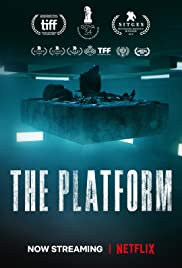
THE PLATFORM
Spain, 2019, 94 minutes, Colour.
Ivan Massague, Zorion Eguileor, Antonia San Juan,
Directed by Galder Gaztelu-Urrutia.
Here is a Spanish film that is dazzling to look at, but also ugly and cruel. It is a symbolic film, an allegory about human society and human nature.
There are 200 floors in the Platform of the title. And it is a prison. It is a hierarchical prison. On the top floor are more privileged prisoners, the first floor, and then the numbers descend. The prisoners are two to a room. What is significant during the action of the film is the feeding of the prisoners. They can make orders as to what they would like to eat. However, the elaborate administration and kitchen pack the lift which is to take the food from the top down, those on the upper floors greedily devouring the food so that less and less remains as it descends.
The central character is Goreng who finds himself in prison and it is not clear always to the audience or to Goring himself as to how he got there all why. His passion is to read. He shares the floor and room with Trimagasi, an old man who seems to have absorbed and succumbed to the system, who will disappear but later reappear to Goring.
As Goring moves to different floors, he encounters a number of strange characters, especially a woman who has been in administration but who turns vicious.
In fact, it is expected of the prisoners that they literally devour each other and receive benefits from surviving. More than a dog-eat- dog situation, it is human-devour-human.
While the platform is a symbol of hierarchical human society, authoritarian and control and manipulation, it is also a story of human nature, often seen at its worst and most cruel.
To that extent, The Platform is a film that could be admired but is also an endurance.
Many bloggers have gone to great pains to explore the themes and meaning of the film and a recommendation to look at many of these on the IMDb.
Below are some quotations indicating the lines of interpretation.
The "Verticle Self-Management? Center" is an allegory for society, with those at the top provided the best of everything and a willingness to consume far more than necessary at the expense of those below, while those at the lowest levels of society must suffer and go without. This can apply to society within a country or the worldwide society of first world to third world countries. It also attempts to show this is the case whether there is a capitalist or socialist economy. In either case, those with the majority of the power generally take what they want.
Most building floors are numbered from lowest to highest from bottom to top, but the prison is the exact reverse with level 1 at the top, the same numbering system as the Circles of Hell in Dante's Inferno. Inhabitants of the Third Circle, reserved for gluttons, are punished for their exercise greed and appetite above on Earth, and like the prison inhabitants on the higher floors, hoard what they desire at the expense of others.
Blood Vessel
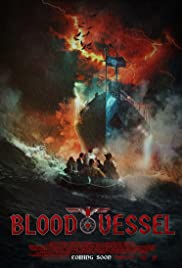
BLOOD VESSEL
Australia, 2019, 94 minutes, Colour.
Nathan Philips, Alyssa Sutherland, Robert Taylor, Christopher Kirby, Alex Cooke, Mark Diaco, John Lloyd Filling ham, Troy Larkin, Vivienne Perry, Ruby Isobel Hall.Directed by Justin Dix.
The title is nicely evocative for a film about a ghost ship. It has been written, produced and directed by Justin Dix, his expertise has been in special effects, especially for his company (again an evocative title) Wicked of Oz Studios, Melbourne-based where Blood Vessel was shot.
So, audience expectation is for a horror film. But horror film suggests different expectations from different audiences. For diehard Monsterfests fans who want instant blood and gore, even in the opening credits, unless it is immediately gory, the film is seen as a failure. Which, is what happened to some of the commentors on this film (recommending only the second half). which is a pity, not doing justice to the establishing of the scene, introducing the characters, a sense of mystery, evocative moments, with the action moving credibly towards the blood and gore in the final 30 minutes.
For this reviewer, the first hour is particularly interesting. We are immediately informed that the action takes place towards the end of World War II. A group of men, and one woman, are adrift in a lifeboat in the North Atlantic, two British, a Russian, two Americans (one sympathetic, African-American?, the other of noxious), an English woman, an Australian soldier. They see the German ship coming towards them in the night. It is a mysterious ship, as they discover dead members of the crew, others vanished.
Apart from the Marie Celeste atmosphere, the first part of the film has a sense of realism, the challenge to each of the characters as to how they are to survive, to make contact, to be rescued. The Australian is a born leader. The Russian is a supportive ally. One of the Americans is surly and presumptuous. And the British woman is a dignified British mother. The Englishman, a code breaker for the British government, is rather weasley (in appearance, glasses and stature, reminding horror fans of Donald Pleasance).
Looking at aspects of the cargo, there is more than suspicion, especially in the discovery of gold bars which might explain what happened to the ship. But there are also evocative suggestions of middle European superstitions, carvings, contents of boxes, mysterious books.
So, most audiences, except for those who have been impatiently longing for the blood and gore) can be satisfied with a mysterious drama.
Spoiler alerts, and alerts to those who might find blood and gore too hard to watch, it does move into demonic presence, overtones of Transylvanian vampirism, as well as echoes of And Then There Were None. And a grimly disturbing ending.
Certainly one of the better films of its genre. (And, impressively made and post-produced in Australia.)
1. Title? The tone?
2. Made in Australia? Locations? Sets and atmosphere? The cast? The special effects? The musical score?
3. The ghost ship genre? Conventions? The ship in the sea, the dead bodies, the missing crew, the radio contact still working?
4. At the end of World War II, the group in the lifeboat, British, American, Russian, Australian? The experiences of each of the characters in the war, Australian prisoner of war, wounded Russian, American sailors, British volunteer and the loss of her daughter, British code breaker?
5. Floating on the sea, sighting the ship, the shot freeing the rope, the group pulling to the ship, boarding, the deserted ship? Discovery of the corpses? Dying in shock? The exploration? The American clashes? Bigelow and his superior manner, Jackson, stopping the engine?
6. Nathan, Tobruk, prisoner of war, taking charge? Discovering the bodies? Later the exploration, the books and boxes with carvings, the contents of the boxes, Bigelow discovering the gold?
7. The sight of the young girl, speaking Romanian, biting Miss Prescott, calming her? Her hiding, eating the rat? The sinister transformation of her face?
8. The Russian, his wounds, the confrontation with the sailor in the locked room, the guns, his death? Miss Prescott tending the wounds? The Russian, collaboration with Nathan?
9. Faraday, his manner, the fears, wounded arm, code breaker, exploring by himself, making radio contact?
10. The transition to horror, the opening of the vault by Bigelow, the monster inside, coming to life like a vampire, his wife and the blood, her resuscitation? Bigelow’s death? The creatures going around the boat, the death of Jackson?
11. The discovery of the cross, the holy water and its use, the book and its spells? The Russian and his being bitten? Wanting to save Nathan and Miss Prescott?, with the axe, cutting off the female monster’s head, into the sea? His being transformed and dying?
12. Miss Prescott, her cross, confronting the monster, her being transformed? Yet appearing normal? Nathan, his rescuing her? The Russian setting off the detonation for exploding the ship? The two going into the water?
13. Miss Prescott, her drowning Nathan? Her being rescued, the British sailors, the final comment about the bloody war? The sinister smile?
14. The use of the conventions, the initial drama, the supernatural transition, the blood and gore?
ARQ
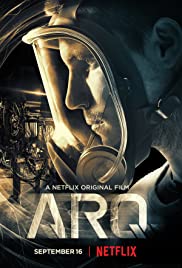
ARQ
Canada, 2016, 88 minutes, Colour.
Robbie Amell, Rachael Taylor, Shaun Benson, Gray Powell, Adam Butcher, Tantoo Cardinal.
Directed by Tony Elliott.
A brief Canadian futuristic science-fiction drama. It also relies on the plot device of a time loop (which, of course, reminds audiences of Groundhog Day – but it has also been used in such other thrillers as Happy Deathday and its sequel).
All the action takes place in the confined laboratories where the Time Machine, ARQ, is situated. A scientist, Renton (Robbie Amell) wakes up with his partner, Hannah (Rachael Taylor). They are set upon by masked men, tied up, get loose, a confrontation. Then they wake up again. But, each time within the timeframe of the loop, they are able to build on what they know, Renton remembering everything, Hannah beginning to remember.
This leads to all kinds of dramas, confrontations, the background of a Civil War, espionage, betrayals, tension between Renton and Hannah, reconciliations, the unmasking of the masked intruders, dissension between the intruders, the killing of different members of the group – and the time loop finishing, starting again.
Ultimately, the couple have to make a decision about the destruction of the machine or allowing for it to continue with loops. They make a decision…
1. Science fiction? Science fantasy? Time loops? In the context of war?
2. Canadian production, the setting within the laboratory, the various rooms, the machine, fight locations? The musical score?
3. The world situation, the civil war? On the outside? Espionage?
4. Renton and Hannah? The initial situation, the time of waking, the attack from the masked group, tied to the chair, cutting loose, getting out, confrontations?
5. Renton, the Time Machine, his role, stealing, preserving? Hannah, the relationship, taking sides in the war, her disappearing? Her collaboration with the group, the family codenames, her being mother? A year away, her resentment towards Renton?
6. The background to the situation, Hannah and her role, with Renton? Betrayal?
7. The recurring days? The action being extended, Renton remembering everything, utilising what he remembered? Hannah gradually remembering?
8. The development of the plot within the loops, confrontations, betrayals, fights, torture, shooting? And Renton and Hannah waking up again?
9. Taking sides, Sonny and his stances, killing the other members of the group? But the repetitions? The outsider coming in, his being killed, reviving?
10. Renton and Hannah, dealing with the machine, trying to disable it, Sonny’s violent death on the machine?
11. News of the war? Decisions about the machine? To disable it? To reset it?
12. The end, and Hannah waking up this time?
Offering to the Storm/ Ofrendo a la Tormenta
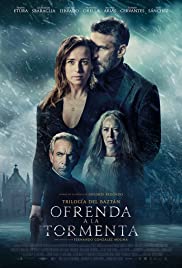
OFFERING TO THE STORM/ OFRENDO A LA TORMENTA
Spain, 2020, 139 minutes, Colour
Marta Etura, Leonardo Sbaraglia, Nene, Francesc Orella, Imanol,Arias, Itziar Aizpuru, Benn Northover, Marta Larralde
Directed by Fernando Gonzalez Molina..
This is the third film in a trilogy, based on novels by Dolores Redondo, and all directed by Fernando Gonzalez Molina. A recommendation to see the first two films before seeing this one: Invisible Guardian and Legacy of the Bones.
There were filmed in northern Spain, the setting for a range of superstitions even in the context of Catholicism, especially concerning evil Demons, sects in the countryside devoted to the Demons, human sacrifice, especially of children.
The film’s focus is on an expert detective, Amaia Salazar (Marta Etura) who has been rejected by her mother and brought up by her loving aunt. She trained in the United States with the FBI and has returned and is the homicide chief in her town, also in a relationship and having a young child.
In this episode, the focus is on the sacrifice of babies, unearthing secrets in the town, mothers who have sacrificed, their being urged to take their own lives, a sinister midwife, a seemingly abandoned mansion in the countryside, cemeteries, mausoleums.
The local judge (Leonardo Sbaraglia) supervises Amaia’s work but is infatuated with her and, surprisingly for many audiences, she allows herself to be seduced by him.
The Catholic element is introduced by the Opus Dei priest who appeared in the previous film and who in this case explains the superstitions background to Amaia and helps her to get final information for her case. And then her mother reappears, not dead as was suggested in the previous film, the mother and daughter having a confrontation on the bridge and the mother slitting her throat.
Amaia is very emotional in this film, many weeping scenes, especially with the murder of her loyal Lieutenant, Jonan (Nene). The ultimate solution is one of betrayal leaving Amaia somewhat bewildered, emotionally drained, looking out the window at the audience at the end.
1. The third in the trilogy? Continuity? Climax to the investigations and family secrets?
2. The setting, the Spanish town, the vistas, the streets and homes, the river and bridge? Police precincts? Hospital? The surrounding countryside, the mountains, the winding roads, mansions and hearts? The musical score?
3. The focus on Amaia, her position as homicide chief? Her collaboration with other members of the force, their respect for her? Her delegating jobs? Her reliance on Jonan? His concern for her, the photos? His access to her files? Amaia and her relationship with James, love for their child? Her continued absences, going off on work? The emotional impact, her grief sequences and tears?
4. The background of the trilogy, Spain, superstitions in the countryside, the gods and monsters of the earlier films, the monster of this film? The sacrificing of children? And financial reward? The impact on Amaia because of her child?
5. Sarasola, his two sequences, his presence in the previous film, Opus Dei, chaplaincy, hospital work? The two sequences of his explanation of the superstitions to Amaia?
6. Amaia and her mother, the previous film and the mother’s disappearance, presumed dead, the other daughters preparing the funeral? The young doctor and his death? The number of deaths and injuries? The old woman, Amaia’s interview, the story of children and death, the walnuts and her gruesome death? Yolanda, her concern about her child, getting Amaia’s help, wanting the graves open to find her babies, getting the explosives, her injuries, the second attempt, the attack on Amaia? Her death?
7. The place of the judge in the town, his attraction towards Amaia, their professional work together, her wanting his permissions? His approaches, love for Amaia, the seduction, Amaia willing, the credibility of her sexual encounters with the judge, and yet her love for her husband and child?
8. The midwife, the visit to her, the interview, a sinister presence? The mansion in the countryside, the owners and their reaction to Amaia? The midwife visiting? The next door neighbour, her noticing everything, having the photo albums, giving the information to Amaia?
9. The death of Jonan, Amaia and her grief, his mother, his partner? The photo cache, of the judge?
10. James, his father’s illness, going home to see him, Amaia unable to go, the nights with the judge? The phone calls?
11. Amaia’s aunt, her stories, love for Amaia, the tarot cards?
12. Her mother’s reappearance, the confrontation on the bridge, slitting her throat? The doctor advising Amaia to see her mother just as a dead of woman and not see has a as a haunting ghost?
13. The explosion, the basement? The police investigation? The tomb, the judge reappearing, Amaia confronting him with the information about his father, the old man hidden away, Father Sarasola and leaving Amaia to him, the story about the various sects, their worship, human sacrifice, wealth?
14. The final confrontation between Amaia and the judge, his urging her not to enter the mausoleum, the finding of the babies, the guns, his death? The fact that the judge had shot Jonan?
15. Amaia, talking to her sister, the story about her husband and the mystery of the first film in the trilogy, their mother, her sister’s illegitimate child, the reunion, the mysteries of deaths?
16. What was the audience left with after this three-part venture into this strange Spanish world? And sharing the experience with Amaia?
Headhunters/ Hodejegerne
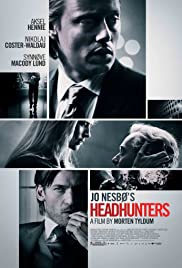
HEADHUNTERS/ HODEJEGERNE
Norway, 2011, 96 minutes, Colour.
Aksel Hennie, Synnove Macody Lund, Nikolai Coster -Waldau, Elvin Sander, Julie R. Olgard, Valentina Alexeeva.
Directed by Morten Tyldum.
Headhunters is a novel by Jo Nesbo whose crime stories are beginning to be more prominent on bookshop shelves. This film might encourage this interest.
With its Norwegian settings, business and fraud plot, many audiences with be thinking of Stig Larsson and his Millennium series. However, the storytelling here is more direct, leaving the complications and twists until the end. In fact, the screenplay is exemplary in taking the audience step by step along the plot, each episode ending with a surprise or a thread that needs development – which does follow. This provides continued interest and curiosity and for some surprises.
During the credits, the central character, Roger Brown (Aksel Hennie) , explains (and the films shows) the steps needed for an art thief to go into a house and substitute a fake work of art for the real thing (and then sell it on the black market). This is the introduction to Roger, who comments on his short stature and his statuesque blonde wife, his good fortune (built on the profits from stealing) and his job as a headhunter, interviewing prospective executives for companies.
When a Danish businessman, Clas Greve (Nicolaj Coster- Waldau)comes from Holland and a prestigious company there to visist his wife’s gallery, Roger interviews him for his job. Greve claims to have a lost Rubens in his apartment. When Roger cases the apartment, he finds his wife’s mobile phone and subsequently rejects Greve’s application for the job.
The tone changes when the arrangements for selling the painting are upset. Some murders ensue and Roger is found under suspicion and attempting to escape the police. Of course, Greve is behind the pursuit and we learn why. After that, it is cat and mouse – and an ending which we may not have anticipated.
A caution for sensitive audiences. There is a vivid sequence in an outhouse when Roger tries to elude his pursuer. It may be too realistic for some, even though it is a strong point in the plot. There is also a car accident with some graphic close-ups of injured bodies.
But, on the whole, Headhunters is well-plotted, written and acted, a satisfying thriller of its kind.
1. The status of thrillers from Norway and Scandinavian countries? The novels of Jo Nesbo? Adaptation?
2. The title, the focus on Roger Brown and his work?
3. The Oslo settings, the world of big business and international connections, lavish homes, offices? The art world? The countryside, old houses and sheds? The mountains, the highways, the lakes? The musical score?
4. Roger Brown, introducing himself, short stature, ambitions, money, seven years married, providing lavishly for his wife, his role as a headhunter, his personality, encountering people, using them, the interview with Lander and manipulating his interviews? His home life, his wife wanting the child, his refusal? The sexual encounter with Lotte and trying to break from her? The sequences of his substituting the pictures, from Lander’s house while he was away, taking the Rubens? His colleague, the manipulation of security systems, the friend driving the paintings to go to Gotheberg? The money, dividing it up? The risks? Seeing Roger in his disguise and in action?
5. The arrival of Clas Greve? His manner? Retired, his aunt’s house, inheriting, redecoration, the Rubens picture? His previous employment – and his pen? The headhunting interviews? With the company, his doing well? The irony of Roger at his house, for the Rubens, discovering his wife having an affair, the mobile phone? His hostility towards Greve?
6. The stealing of the picture, Roger and Ove and his rival, the encounter with his security agent, the Russian girlfriend, the cameras and the colleagues watching? Finding his friend on the seat of his car, the syringe, putting them in the boot, taking him home, drinking the milk, the confrontation with the guns, his friend dead?
7. Roger, taking the picture, going to the country house, parking the car, trying to hide the picture? Great arriving? Roger hiding in the toilet, surviving? Getting out, finding the owner of the house dead, driving, the pursuit by the dog,, taking the tractor and impaling the dog, the crash? In hospital, the police guards, the arrival of the inspector, his trying to escape, in the car, the story of the local truck, the policeman trying to stop it, the crash, the car over the cliff, the deaths, Roger surviving, pretending to be dead when Greve was searching?
8. Changing identity with the policeman, going to see Lotte, her phoning Greve, the revelation of the true story, the affair, her wanting out, her putting the traces in his hair? Her trying to stab him, his shooting her?
9. Contact with Diana, her confessing the affair, not putting the magnets in his hair, the possibility for a child? Her helping him in the ultimate confrontation?
10. Roger shaving his head, hiding the hairs, wanting to recover them, disguise, going to the autopsy room, on the train, the setup in the house? Greve tracking him down through the hair? The talk, the threats, the truth about Greve in the bankruptcy of his firm, wanting the new job, to steal the technical information?
11. Roger using his wits, the guns, Diana removing the bullets, the death of Greve?
12. The cynical ending – Roger, some personal reformation, Diana pregnant? Back at his job, as if he had been travelling? Getting the position to capital lander?
13. The police, the solution, the media, the investigator and his reputation?
Agatha Christie's Poirot Labours of Hercules
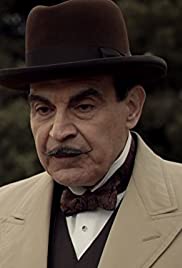
THE LABOURS OF HERCULES
UK, 2013, 90 minutes, Colour.
David Suchet, Rupert Evans, Eleanor Tomlinson, Simon Callow, Tom Austen, Fiona O' Shaughnessy, Morven Christie, Sandy Mc Dade, Orla Brady, Nigel Lindsay.
Directed by Andy Wilson.
The Labours of Hercules is the second last production of the television series, ranging from 1989 to 2013, with David Suchet as Poirot. He was 43 when he began the series, 66 when it concluded. He is more than a touch older now, with many regrets.
The original book had 12 short stories relating to the 12 labours of Hercules, focusing on each of the characters. The screenplay brings them all together, a murder mystery, an art thief, a chalet in the Swiss Alps.
Rupert Evans is an earnest young hero. Eleanor Tomlinson is very striking – especially at the end and the revelations. Orla Brady plays the Countess, her mother, the same Countess who had charmed Poirot in the film, Double Clue. Simon Callow is his usual screen presence as the doctor.
All the suspects are cut off by an avalanche and there is another murder. However, Poirot notices many details, gets the manager, Francesco (Nigel Lindsay) to get various pieces of property from the rooms and, revealing them and their meanings, centres on the unexpected revelation of the murderer and thief.
1. The popularity of Agatha Christie mysteries? The adaptations for the television series? This as the second last in the series? David Suchet as Poirot?
2. The original book, the labours of Hercules, the 12 chapters, the focus on particular characters? Combining them in the one screenplay?
3. The London settings, the reception, lavish? The police presence? Anticipation of the thief? The murder? Poirot reassuring the victim? Her death and the robbery? His sense of guilt, depression? Going to the psychiatrist? Urged to take on a new case?
4. Poirot and the driver, his melancholy about the death of his girlfriend? Poirot’s reassurance?
5. Poirot going to Switzerland, the mountains, the funicular, the hotel, exteriors and interiors, lavish? Reception? The rooms? The musical score?
6. The police? Expectations of the thief to arrive? The police on the staff? Francesco, his warm welcome, management, jovial, taking bribes? The other members of his staff?
7. The guests arriving, Mrs Rice, haughty, her daughter, the abusive husband? The cries during the night? The superiority of Mrs Rice and her dealing with people? The contrast with the Countess, memories of her encounter with Poirot, the romantic memories? The presence of her daughter? Alice, the English name, studying crime and investigation, the challenges to Poirot?
8. The dancer, in England, the health, breakdown, going to Switzerland, the doctor caring for her? His orders? Her staying in her room? The interview with Poirot? Her coming down to the dining room?
9. The insurance salesman, undercover police? His role in the investigations?
10. Alice, her being assaulted in her room?
11. Gustaf, mysterious, Robert found hanged, Gustaf not revealing the master, claiming to be the thief? His death?
12. Poirot getting Francesco to collect passports, writing cases, other material from the rooms?
13. Harold, his presence at the reception, sent overseas by the Foreign Minister? His presence in Switzerland, at the hotel, allegedly in disgrace because of an illegitimate child (and the revelation that the child was that of the Minister)? The attraction to Mrs Clayton? Coming her to her defence? Her leading him on? The disapproval of Mrs Rice? The revelation of the truth, con women? Harold hiding them in his room?
14. The assembly, Poirot’s criticism of all present, Francesco and the bribes, the Countess and her stealing Mrs Rice’s approach, the two women and their confidence tricks and fraud, the dancer, the bogus status of the doctor? But urging Harold to heroism?
15. The revelation, the Countess and her daughter, the thief, the taking of the paintings of the labours of Hercules, disguising them at the hotel, the doctor and his work as a fence?
16. The confrontation, the guns, the police, the gun in Alice’s mother’s bag? Her ultimate defiance?
17. The truth about the dancer, in love with the chauffeur, the disguises, leaving, the return – and Poirot reuniting them, and atoning for his sense of guilt?
6 Underground

6 UNDERGROUND
US, 2019, 128 minutesColour.
Ryan Reynolds, Melanie Luarent, Corey Hawkins, Adriana Arjona, Manuel Garcia- Rulfo, Ben Hardy, Lior Raz, Dave Franco.
Directed by Michael Bay.
This is a Michael Bay action show – fulfilling all the hopes of Michael Bay fans, fulfilling all the criticisms of Michael Bay non-fans.
The 6 underground are six warriors who take on cases of protection, participation in uprisings to remove dictators and install more favourable rulers.
There are a range of settings, the fictitious country of Turgistan, Italy, Las Vegas, Hong Kong. There are fights, battles, assassinations.
Ryan Reynolds is the leader of the group – who seem to have some kind of immortality (a connection with the themes of Charlize Theron and Co in The Old Guard).
1. Michael Bay action adventure? Pace, action, sound volume, editing and pace? Larger-than-life?
2. The range of settings, Turgistan, US and Las Vegas, Italy and Florence, Hong Kong. Audiences caught up in these locations? Musical score and atmosphere?
3. Turgistan, the regime, the up people, the violence? One and his experience? Billionaire, his inventions and magnets? His change of pace, forming the group? Motivation?
4. The range of the group, Two, a spy; Three, a hitman; Four, a parkour runner and thief; Five, a doctor; and Six, a driver. Their personalities, anonymity, interactions, revelation of names? And Blaine, his work, self-conscious, guilt, recruited, becoming Seven?
5. The dictator, his power, personality, henchman? His brother? His brother in exile? The rescuer of the brother from Hong Kong?
6. Sequences in Italy, the Mafia, car chases in Florence? Sequences in Las Vegas, the assassination of the generals?
7. The buildup to the return Turgistan, the plan, the taking over of the radio station, substituting the brother’s voice? The dictator fleeing to the yacht, the pursuit of the yacht, the technical overpowering of the yacht?
8. The defeat of the dictator, the installation of the brother?
9. And future plans for 6 underground?
Boys State
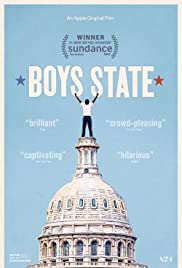
BOYS STATE
US, 2020, 109 minutes, Colour.
Directed by Amanda McBaine?, Jesse Moss.
This is a very American documentary. It offers insights into the world of American politics, so different from that of many other countries. Audiences from these countries will be surprised, and sometimes alarmed. However, given the state of American politics in the American presidency during the years when this film was made, the first term of President Trump, non-American audiences will be given plenty to reflect on.
Boys State is an American institution, established by the American Legion in 1935. During the opening credits there are indications as to some prominent personalities who participated in the boys State exercise: Dick Cheney, Bill Clinton, Rush Limbaugh.
This annual event in many of the states of the union takes place over a week. This film’s focus is on the event for boys, generally age 17, and for this film in the state of Texas.
Gradually, the audience begins to understand what is in play. And, serious play it is. The boys are interviewed by members of the American Legion and approved for participation and scholarship. They assemble, a thousand of them, in uniform dress, in dormitories and with large dining room, meeting rooms. The boys are immediately divided into two groups, the Nationalist Party, the Federalist Party.
Over the week, they are to go through various processes that parallel the party assemblies, nominations and campaigns, elections, in state politics.
Several boys are singled out by name early in the film so that the audience has a particular focus. They form an interesting cross-section of young Americans. It is a surprise to find that Ben, has had two leg amputations because of meningitis as well as having an injured arm. But, he has a strong presence and determination, very few holds barred, not any way impeded by his disability except in a walking limp, with his eye on the governorship in the final election but finding his place as Party Manager, recruiting, campaigning, chairing meetings, strong on input and motivation.
We are also introduced to Steven Garza, Mexican background, short, swarthy, participating in demonstrations about guns, very determined, quieter in his approach, also aiming for governor, energetic in his campaigning and making friends.
The other two principal boys are quite a contrast, René, African-American?, self-conscious, but self-confident, intense speech campaigning for Party Manager, winning, but falling foul of some dissidents who want to impeach him. By contrast there is Robert, may be seen as a typical Texan, easy-going, not particularly sensitive to others’ feelings or holding on to issues, intent on being accepted to West Point.
For audiences who find this Boy’s State week unusual, it is sometimes difficult to keep pace with what is happening, campaigns, speeches, voting, selection of candidates – and the number of convention equivalents to hear the ideas of the candidates for governor. However, every so often, there are more personal interviews with the forenamed boys, their emotional reactions to what has happened to them, their political and philosophical reflections. For so many, the motivation is: win at all cost, truth is not always relevant. René says at the end that one boy would make an excellent politician – but that was not a compliment.
Of interest to American audiences and to non-American audiences is the selection of political issues that the boys want to debate. While they are vociferously patriotic, songs, music, brass band as boosters, one of the key issues is gun-control, the Second Amendment, an emphasis on bearing arms and defending oneself that seems alien to many non-Americans. There are also some enthusiastic anti-abortion stances, one or another of the boys quietly mentioning that he was pro-choice, an allusion to LGBTQ issues only, passing mentions of education.
The film serves as a record of the thinking of young men in America of this period, a snapshot – and interesting to reflect on 10 years earlier and the election of President Obama. And, our wondering what the equivalent will be like for the 2028 American election.
Invisible Guest, The/ Contratiempo
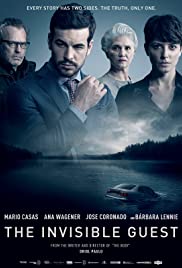
THE INVISIBLE GUEST/ CONTRATIEMPO
Spain, 2017, 106 minutes, Colour.
Mario Casas, Anna Wagener, José Coronado, Barbara Lennie.
Directed by Oriol Paulo.
The Invisible Guest is an intriguing murder case. There is a strong Spanish atmosphere about the film, about contemporary business, about legal structures, about prosecution and defence. There is also the atmosphere of the Spanish countryside as well as of the cities.
The film initially focuses on Adrian, Mario Casas, accused of murdering his lover in a hotel. His lawyer has been on the case, getting information, altering situations like hotel and flight bookings, covering up. Very strong and strong-minded woman advocate arrives at Adrian’s hotel, Virginia Goodman (Anna Wagener) and puts Adrian through his paces in order to prepare for his defence in court and the arrival of a surprise witness.
Adrian has been lying but Virginia Goodman draws out his narrative about what happened, his rendezvous with a lover, their driving back to the city, a deer running across the road, an accident, a car skidding and a young man dead. Adrian explains how Laura, the lover, took control of the situation and he went along with it, including pushing the car with the dead body into a lake.
There is also the theory about the father of the dead man, who had assisted the lover in the repair of her car, tracking down Adrian, setting up meetings in a hotel, attacking Adrian, killing the lover, and how he got out of the locked room.
However, Virginia turns the tables and raises a different hypothesis, the film visualising how Adrian was in charge and control the whole situation, even to killing his lover and setting up the story about the vengeful father.
There is what seems an extraordinary revelation at the end, a dramatic twist to what is an absorbing drama. Some have complained that the screenplay is, in fact, full of plot holes and, therefore, implausible. However that may be, the whole film is nevertheless intriguing.
1. Police investigation? Legal defence? Reality and hypotheses?
2. The Spanish settings, the city, offices and business, socials? The countryside, hotels, the roadside? The musical score?
3. The title, the killing in the hotel? The locked room?
4. The focus on Adrian, how sympathetic a character? His business achievement? Connections with Asia? Businessman of the year? His marriage, child? His relationship with Laura, the rendezvous in the countryside, not going to Paris? Ending the affair or not?
5. The drive back, the deer, the car skidding, the dead man? The dilemma for Laura? For Adrian?
6. The opening of the film with Virginia Goodman, strong presence, arriving early for Adrian? Her role, her career in defence, never having lost? Her last role and determination? Her personality, the discussions with Adrian, penetrating, getting him to tell the truth, alternate hypotheses? The information from Felix? The surprise witness and being prepared?
7. Adrian, his lies, gradually telling the story to Virginia, Laura taking charge, the driver passing by, pretending to exchange insurance information? Driving the car, Adrian saying it was stolen from the airport? Laura making Adrian put the body in the boot of the car, his decision, reluctance, pushing the car into the lake? Phone calls, reassuring Sonia?
8. Virginia, challenging Adrian, the locked room, the hypothesis of Thomas Garrido following Adrian? His wife working at the hotel? The booking, the phone calls, Laura setting up the situation, Thomas and his wife helping, the locked window, the key to open it and lock it again? His getting into the room, attacking Adrian, killing Laura? The crowds outside? The police, suspicions, arresting Adrian? The large bail?
9. Adrian’s story tying in with what the audience saw initially?
10. Virginia, turning the tables, the visualising of a different scenario, Adrian taking charge, Laura upset, the victim? The young man still alive in the car? Adrian a murderer? Adrian doing the arranging for the meetings? His upset with Laura? Killing her?
11. The Garridos? Their son, the crash, his death? The story of Laura transferring the money from his bank making him guilty? Laura and the encounter with Thomas, going to his house, fixing the car, the difficulties with their son’s mobile phone ringing, her saying that the car was her sisters?
12. Thomas and his wife, her being in hospital, the pursuit, the inconsistencies about the car, ownership, adjusting the driver seat, the phones?
13. Virginia pointing out Thomas at the window opposite the hotel? His following Adrian?
14. Felix, the law, altering evidence, paying off the driver who stopped to help?
15. The final revelation, Virginia removing her make-up and mask, the fact that she was Thomas’s wife – and their background in theatre? Her performance as Virginia? Their both at the window watching Adrian?
16. The arrival of the actual Virginia?
17. The credibility of the plot, the connections, far-fetched or possible?
Born to Dance/ 2015
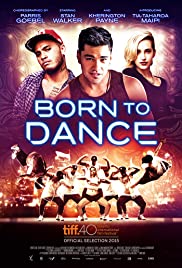
BORN TO DANCE
New Zealand, 2015, 96 minutes, Colour.
Tia Maipi, Stan Walker, Kherrington Payne, John Tui.
Directed by Tammy Davis, Chris Graham.
The title is very clear. This is a contribution to the very popular genre of dance films that have followed popular trends on screen since the 1980s. The films have had various titles like Step Up… It is also in the vein of all those competition films, Bring it On, Pitch Perfect….
This is a New Zealand contribution.
It is not particularly startling, as might be expected. However, it has a lot of local enthusiasm.
Tia Maipi portrays Tu, a young man in South Auckland who is part of a hip-hop group. He works in a factory. His mother is dead. His father is military, very demanding, making his son jog every morning, wanting him to join the military as well unless Tu can come up with something else substantial. The son does mention dancing to his father but that is ignored.
Audiences for this kind of film generally do not mind if the screenplay is predictable. Tu does a demonstration tape. It is taken up with interest by a popular Auckland group and he goes to audition, is accepted for training and he has great hopes for ultimate selection. He does not really have a girlfriend at home but is devoted to his group – but on the advice of his friend at work (who then gets arrested and imprisoned for drug dealing), does not tell the group that he is is going to the audition. (Complaints from them later.)
He also meets an American girl from Auckland’s North Shore. She, of course, is the girlfriend of the director of the important hip hop group.
Quite a lot of dancing and turns, especially at the end with the inevitable competition, Tu not accepted by the group, his going back to his own hip-hop company, their training up – and, as with so many similar films, they excel and win. And Dad is there in the audience.
Born to Dance offers exactly what the target audience wants, with the Kiwi accent and atmosphere.